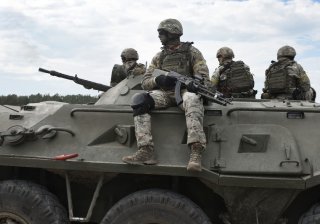The United States Must Not Enflame Central Asian Conflicts
While the United States has been involved militarily in Central Asia, now is the time to recharacterize its engagement in the region by further distancing itself from this militaristic past.
The potential for another border clash between Kyrgyzstan and Tajikistan is becoming more likely as the two countries engage in an arms race. Territorial and water resource disputes characterized previous border clashes in 2021 and 2022. A renewed Kyrgyzstan-Tajikistan border conflict would be dangerous as North Atlantic Treaty Organization (NATO) allies Turkey and the United States find themselves supporting countries on opposing sides.
Following the U.S. withdrawal from Afghanistan, Washington’s approach to security in Central Asia has become more modest as temporary U.S. military bases in Uzbekistan and Kyrgyzstan have been closed. However, the United States is still involved in Central Asian security affairs as, since Tajikistan’s independence, Washington has provided Tajikistan with $330 million in security sector assistance. This sizable sum includes hundreds of vehicles, a comprehensive training center, and border management and customs control support. As a result, the United States has become one of Tajikistan’s top security donors despite Russia being Tajikistan’s most significant security and trading partner.
Meanwhile, pan-Turkic solidarity has prompted Ankara to support Kyrgyzstan in its conflict with Tajikistan by providing it with Bayraktar TB2, Aksungur, and Anka unmanned aerial vehicles (UAVs). Turkey was the first country to recognize Bishkek’s independence and has since placed importance on maintaining stability and development in Kyrgyzstan. Additionally, Turkey can expand its influence among ethnically Turkic countries in Central Asia while Russia is tied up in its war in Ukraine.
With NATO allies supporting opposite sides of a conflict, tensions between Washington and Ankara will unnecessarily rise. Since the early 2000s, relations between the two countries have deteriorated, stemming from differences over the U.S. invasion of Iraq in 2003. Indirectly competing with Turkey by providing military support to Tajikistan will compromise a troubled but important diplomatic relationship for the United States.
The United States is not directly impacted by security matters in Central Asia, especially after withdrawing troops from Afghanistan. Despite the withdrawal, the United States has been on a mission to preserve the sovereignty of the Central Asian states by working on security cooperation-related issues via the Organization for Security and Cooperation in Europe (OSCE), NATO’s Partnership for Peace program, and the United Nations. Instead, security matters in Central Asia should be handled by countries more directly affected by unrest in the region.
Russia and China have much larger stakes in Central Asia, with Russia as the most prominent security provider and China as a significant economic investor. Moscow primarily aims to minimize the spillover of “radical Islam,” which it perceives was exacerbated by the U.S. withdrawal from Afghanistan. Drug trading, human trafficking, illegal migration, and terrorism are Russia’s biggest security concerns in Central Asia. Russia’s security presence serves China as it protects its increasingly large investments in Central Asian transport and energy spheres.
With Russia’s security profile in Central Asia decreasing because of its focus on the war in Ukraine, China has become a more relevant security force in Central Asia. Tajikistan and Kyrgyzstan have been responsive to the Chinese presence in the region, which includes military exercises, military equipment transfers, the construction of security infrastructure, and the deployment of private security companies. The United States risks unnecessarily raising tensions with Beijing by contributing to Tajikistan's security.
U.S. support for Tajikistan’s defense capabilities is also awkward due to Tajikistan’s recent security cooperation efforts with Iran. Similar to Turkey and Kyrgyzstan, Iran and Tajikistan share ethnic and linguistic ties. In May 2022, Iran inaugurated its first drone production facility in Tajikistan, which will manufacture and export the multipurpose Ababil-2 drones. This year, Iran became a member of the Shanghai Cooperation Organization, a Eurasian political, economic, international security, and defense organization established by China and Russia. As a result, Tehran and Dushanbe will likely engage in further security cooperation.
The United States has little control over how its military resources are used once they are handed over to a foreign government. While the United States does not intend to support Tajikistan in its conflict with Kyrgyzstan, much of its equipment, such as night-vision goggles, has been utilized in the Kyrgyz-Tajik hot zone. Instead of needlessly contributing to escalating tensions in Central Asia, the United States should work with Turkey to encourage diplomatic talks between Bishkek and Dushanbe. As mutual NATO members, the United States and Turkey have the opportunity to avoid a plummet in relations by putting to rest a minor conflict of little strategic importance to Washington.
Lastly, the United States should work to reduce and ultimately eliminate programs to send military equipment to Central Asian countries, including Tajikistan. With significant Russian and Chinese security presence and military assets in Tajikistan, Dushanbe has the means to defend itself. The United States has no justified reason to do Russia and China’s job by providing for Tajikistan’s defense.
The United States should leave security matters in Central Asia to regional great powers, namely Russia and China. While the United States has been involved militarily in Central Asia, now is the time to recharacterize its engagement in the region by further distancing itself from this militaristic past.
Alex Little is an MS graduate of Georgia Tech and specializes in Russian and Central Asian affairs.
Image: Shutterstock.

